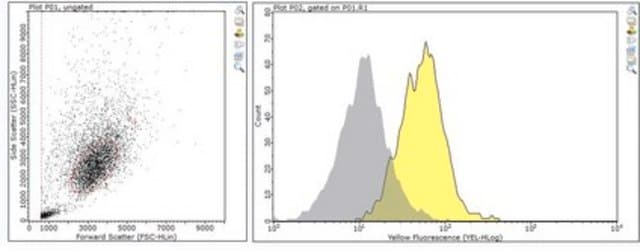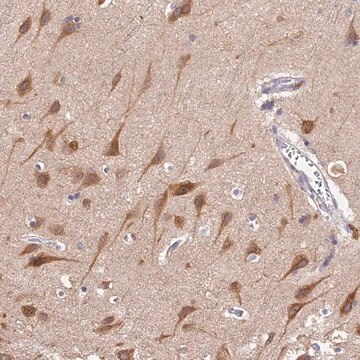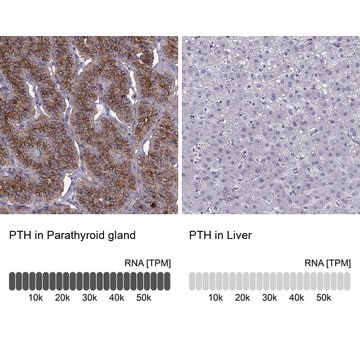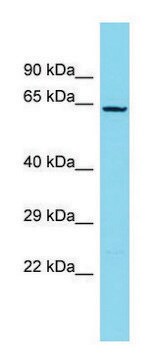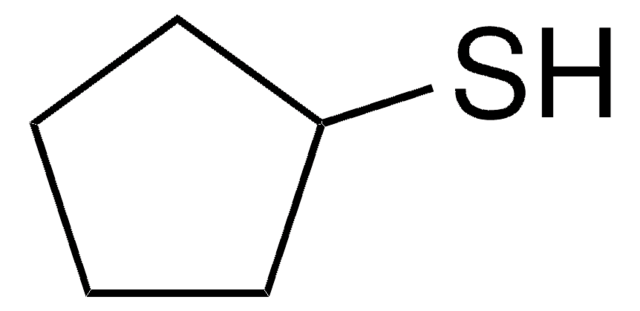MABF2033M
Anti-CD31/PECAM-1.3 Antibody, clone MBC 78.3
clone MBC 78.3, from mouse
Synonym(e):
Platelet endothelial cell adhesion molecule, PECAM-1, EndoCAM, GPIIA′, PECA1, CD31
About This Item
Empfohlene Produkte
Biologische Quelle
mouse
Qualitätsniveau
Antikörperform
purified antibody
Antikörper-Produkttyp
primary antibodies
Klon
MBC 78.3, monoclonal
Speziesreaktivität
human, canine
Verpackung
antibody small pack of 25 μg
Methode(n)
flow cytometry: suitable
immunohistochemistry: suitable
immunoprecipitation (IP): suitable
western blot: suitable
Isotyp
IgG1κ
NCBI-Hinterlegungsnummer
UniProt-Hinterlegungsnummer
Posttranslationale Modifikation Target
unmodified
Angaben zum Gen
human ... PECAM1(5175)
Allgemeine Beschreibung
Spezifität
Immunogen
Anwendung
Entzündung & Immunologie
Flow Cytometry Analysis: 1 µg from a representative lot detected CD31/PECAM-1.3 in THP-1 cells.
Western Blotting Analysis: A representative lot detected CD31/PECAM-1.3 in Western Blotting applications (Zhao, T., et. al. (2001). J Cell Biol. 152(1):65-73).
Agonist or Inhibitor Analysis: A representative performed agonist or Inhibitor function (Newton-Nash, D.K., et. al. (1999). J Immunol. 163(2):682-8; Reedguist, K.A., et. al. (2000). J Cell Biol. 148(6):1151-8).
Immunoprecipitation Analysis: A representative lot detected CD31/PECAM-1.3 in Immunoprecipitation applications (Newman, D.K., et. al. (2016). Sci Signal. 9(418):ra27).
Immunocytochemistry Analysis: A representative lot detected CD31/PECAM-1.3 in Immunocytochemistry applications (Newman, D.K., et. al. (2016). Sci Signal. 9(418):ra27; Zhao, T., et. al. (2001). J Cell Biol. 152(1):65-73).
Qualität
Immunocytochemistry Analysis: A 1:500 dilution of this antibody detected CD31/PECAM-1.3 in un-permeablilized THP-1 cells.
Zielbeschreibung
Physikalische Form
Lagerung und Haltbarkeit
Handling Recommendations: Upon receipt and prior to removing the cap, centrifuge the vial and gently mix the solution. Aliquot into microcentrifuge tubes and store at -20°C. Avoid repeated freeze/thaw cycles, which may damage IgG and affect product performance.
Sonstige Hinweise
Haftungsausschluss
Sie haben nicht das passende Produkt gefunden?
Probieren Sie unser Produkt-Auswahlhilfe. aus.
Lagerklassenschlüssel
12 - Non Combustible Liquids
WGK
WGK 2
Flammpunkt (°F)
Not applicable
Flammpunkt (°C)
Not applicable
Analysenzertifikate (COA)
Suchen Sie nach Analysenzertifikate (COA), indem Sie die Lot-/Chargennummer des Produkts eingeben. Lot- und Chargennummern sind auf dem Produktetikett hinter den Wörtern ‘Lot’ oder ‘Batch’ (Lot oder Charge) zu finden.
Besitzen Sie dieses Produkt bereits?
In der Dokumentenbibliothek finden Sie die Dokumentation zu den Produkten, die Sie kürzlich erworben haben.
Unser Team von Wissenschaftlern verfügt über Erfahrung in allen Forschungsbereichen einschließlich Life Science, Materialwissenschaften, chemischer Synthese, Chromatographie, Analytik und vielen mehr..
Setzen Sie sich mit dem technischen Dienst in Verbindung.